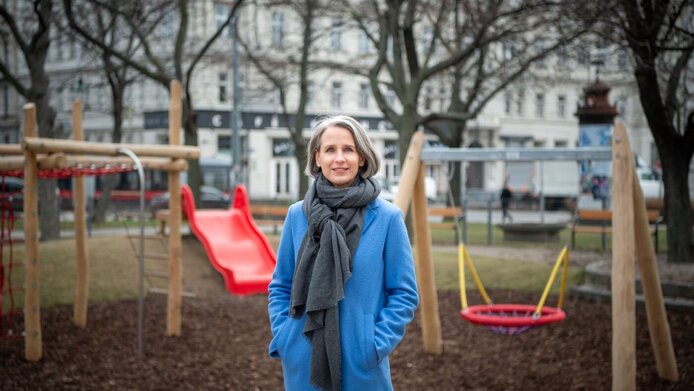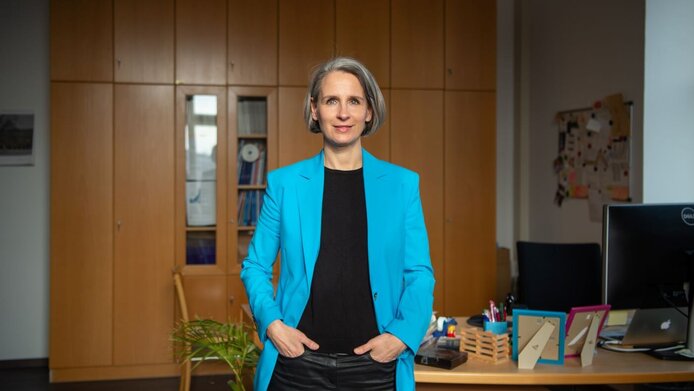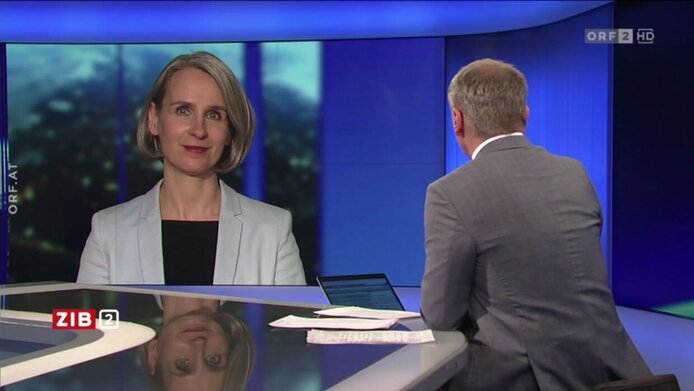Strategies: working at odd hours and parking the children in front of the TV
What strategies did parents choose to manage the balancing act between working from home, home-schooling and taking care of the family? Zartler tells of women who start their day at four in the morning so that they can get three hours of work in before waking up the rest of the family, or of mothers who park their children next door in front of the television set while taking part in a video conference, in order to give the impression that everything was fine. “If that were true, we wouldn’t need schools and childcare facilities,” says Zartler, who perceives this discussion to be disparaging to educators. She quotes the following example: “Would you trust a nursery teacher who claims that she was able to provide excellent care to the children while answering emails and conducting a few telephone conferences on the side? That is exactly the situation parents were in when working from home.”
Exhausted and muddling through in the autumn
After the first tough phase of the pandemic in the spring, many parents had no opportunity to recharge their batteries in the summer either: holidays had been used up, care networks involving grandparents had already broken down in March. In the autumn, parents felt resignation and lethargy on top of exhaustion – the latter already clearly discernible in early summer. “I can’t go on, but I have no choice, I have to muddle through somehow,” is how Zartler describes that state of mind. When school started, the heightened performance expectations added an additional burden: now children were expected to catch up with everything they had missed out on. “Some parents were really desperate. Their additional role as teacher massively overtaxed many of them in terms of content, didactics and keeping the children motivated,” Zartler reports.
Concerns about children’s education and mental health problems
In the autumn, parental concerns reached new heights with regard to schooling and educational opportunities, but also with a view to the children’s mental health. “Some parents were distraught because their children showed signs of psychological stress, such as depression, bouts of aggression, eating disorders, bed wetting or sleepwalking,” Zarter notes.
One in two pupils suffers from symptoms of depression
In early February 2021, a study by the Danube University in Krems corroborated these findings with alarming figures: one in two pupils suffers from symptoms of depression, anxieties and sleep disorders. This concerns a grand total of roughly 1.2 million children and adolescents. A particularly alarming number: 16 per cent of the 3,052 pupils interviewed report suicidal thoughts. This is a marked increase compared to the previous figures. Yet another worrisome fact: compared to 2018, pupils used their cell phone twice as much in 2020, viz. at least five hours daily. This is added to the screen time spent in distance learning. Preliminary studies have shown that psychological problems rise along with longer daily cell phone use. The authors of the study perceive an “urgent need for action” and demand psychological counselling and more physical exercise for the children and young people.
Single parents are particularly affected
It is the parents who have to mitigate the mental health problems of their children – and they have to do it while feeling the strain themselves. They are plagued by existential fears, loss of income, worries about their own old parents, who many of them also look after, and the permanent uncertainty about the future. As Zartler notes, the extent to which someone is overburdened depends greatly on their general circumstances. The groups whose resources were scarce even before the crisis are particularly affected: mainly single parents and socially deprived families with cramped living conditions, but also families where the level of potential conflict and violent aggression runs high.
Pandemic as a social accelerant
“The pandemic has exacerbated social inequalities. It has revealed which groups are particularly vulnerable and which social spheres are found wanting, such as employment without social protection and a school system in which pupils are left behind,” notes Zartler. Her diagnosis confirms the findings of Bernhard Kittel, a sociologist at the University of Vienna.In his longitudinal study “Austrian Corona Panel”, Kittel has been exploring from the outset how people in Austria are coping with the pandemic. He arrives at this central insight: “The pandemic has exacerbated the divisions in society.”
Partners fight about housework
This crisis has clearly pushed families to their limits: in addition to role overload and anxiety about livelihood, families have experienced a marked increase of conflicts – both between parents and children and between the parents. The most frequent bone of contention between the partners was who would take on how much of the extra burden. In stark contrast to initial, almost euphoric, hopes in the spring of 2021 that the crisis might provoke a shift in roles, all studies pertaining to this issue show that the existing role definitions were cemented rather than blurred: in families where the mothers were shouldering the main burden of family work, they also carried the additional burden in the crisis.
Potential for conflicts: postponing divorce
Another important effect which surfaces in any crisis, as Zartler notes: people are forced to question life-changing decisions such as getting married, getting a divorce or having a baby. Uncertainty about income or the loss of family income following short-time work or job loss may lead to a divorce being postponed and the couple continuing to live under one roof. “A high conflict potential, psychological and physical violence may become an enormous problem in such families,” explains Zartler. She also notes that cramped living conditions in many families will also lead to children being much more likely to witness fights between their parents.
“New normal” – the things families need
One year after the first lockdown, Austria's families are still living in a state of emergency – often referred to as the “new normal”. The uncertainties remain. What things do families need? More unequivocal information; functioning childcare facilities and an effort to provide them on the part of policy-makers; financial, organisational and legal support such as regulations for working from home. But they also need something that policy-makers could implement very quickly: appreciative communication. “Parents can only pursue their professions if they know their children are well looked after and not merely tolerated at an institution. They want to be able to make use of the care services for their children without feeling guilty about it,” Zartler states.
Stigmatised parents and children
This is an allusion to Chancellor Kurz, who said at a press conference on 21 April 2020 that it was “not shameful” to put your children in day care “if you can’t cope anymore”. This statement not only revealed a lack of appreciation for educational institutions and educational professions, but was also sorely lacking in any recognition of the important societal tasks that parents have taken on during the crisis. “In this way, Kurz communicated that only parents who are completely in over their heads should send their children into day care. This stigmatises both the parents and their children.”








